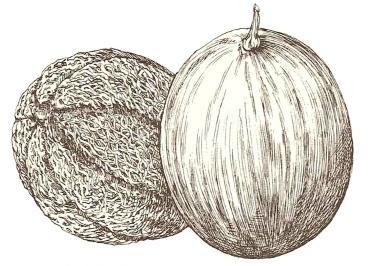 If anything says "summer" to most folks, it's a juicy slice of a good ripe melon.
If anything says "summer" to most folks, it's a juicy slice of a good ripe melon.
Melons can be correctly referred to as either fruit or vegetable. They're members of the vine crop (cucurbit) family, which makes them vegetables. But technically the word "fruit" means any ripe, seed-containing growth from a flowering plant.
Most gardeners are familiar with muskmelons, though they may think of them as cantaloupes. There is some confusion about these two types. A cantaloupe is a small, hard-skinned melon that originated in Italy but isn't grown much in America. "Muskmelon" more accurately refers to the round, netted or smooth-skinned melons belonging to this particular species, which happens to include cantaloupe. The confusion arises because the two have come to mean exactly the same thing in this country. Seed companies, grocers and local growers use the terms interchangeably.
An increasing number of "exotic" melons are showing up in produce markets and seed catalogs. These include crenshaw, honeydew and Charentais. Grown much the same way as muskmelons, these melons are bursting with an almost tropical flavor.
WatermelonsWhere watermelon is concerned, you can now try compact, round (or "icebox") types; yellow-fleshed fruits or seedless ones in addition to the traditional oblong types. And you thought a melon was a melon!
Speciality MelonsHere's a description of some specialty melons:
Charentais -- A traditional French melon with modern varieties that look like muskmelons. It has deep-orange flesh and a honey-like flavor.
Crenshaw -- A salmon-fleshed, oval melon with dark green skin that turns mottled yellow when ripe. Needs a long season to mature.
Honeydew -- A sweet juicy, pale green-fleshed melon, with smooth tan skin that, unlike other melons, will not continue to ripen off the vine. These store longer than muskmelons.
Mediterranean -- Also known as Israeli, Galia, or Middle Eastern melons. A large group of tropical melons that generally have yellow skin when mature and a sweet, aromatic, pale green or white flesh.
Marvelous MelonsDays to maturity () are from seeding in the garden until first harvest.
Alaska (70) Muskmelon; An early, hybrid for short growing seasons; produces 4-pound fruits.
Ambrosia (86) Muskmelon; Hybrid, 5-pound melon with sweet, salmon flesh; resistant to powdery mildew.
Crimson Sweet (90) Watermelon; Produces 25-pound oval, sweet, red-fleshed fruits; good disease resistance.
Early Crenshaw (90) Crenshaw; Early-maturing hybrid with 14-pound fruits and delicately flavored peach-colored flesh.
Earli-Dew (85) Honeydew; Early-maturing hybrid with 2- to 4-pound fruits and lime-green flesh.
Earliqueen (70) Muskmelon Hybrid; 3- to 4-pound fruits with thick, orange flesh.
French Orange (75) Charentais cross; Hybrid cross between French Charentais and a muskmelon; produces 2- to 4-pound fruits with very aromatic, deep-orange flesh; good disease resistance.
King of Hearts (82) Watermelon; Seedless hybrid that produces 15-pound oval fruits.
Moon and Stars (95 ) Watermelon; Oblong heirloom with dark green skin covered with yellow "moon and stars" markings; very sweet, pink flesh.
Passport (73) Mediterranean; Widely adapted 5- to 6-pound hybrid with light green flesh; good disease resistance.
Sugar Baby (85) Watermelon; Compact, round variety that produces 8- to 10-pound fruits.
Yellow Doll (70) Watermelon; Oval, yellow-fleshed hybrid with 4- to 8-pound fruits.
 Victory Seed Company has all the seeds you want for your best garden in 2024.
Victory Seed Company has all the seeds you want for your best garden in 2024.
For 25 years, the family-owned Victory Seed Company has provided the highest quality vegetable, herb and flower seeds to families across the country. We are passionate about providing you the best seeds available that give excellent germination, robust plants, and the harvest you want. With a catalog of over a thousand varieties, we have everything, and our prices are the kinds that we'd want to pay. We have hundreds of yesterday's heirloom vegetables, as well as today's award winning hybrid selections. Get to know us by visiting our website and browsing through our online vegetable seed catalog.
| 1. Getting Started with Vine Crops |
| 2. Cucumber Varieties |
| 3. Getting to Know Squash |
| 4. Melon Varieties ← you're on this article right now |
| 5. Pumpkin Varieties & Growing Big Ones |
| 6. Ornamental and Unusual Gourds |
| 7. How All Vine Crops Grow |
| 8. Cross Pollinating Melons and Squash |
| 9. Cucumber Essentials |
| 10. Melon Essentials |
| 11. Pumpkin Essentials |
| 1. Getting Started with Vine Crops |
| 2. Cucumber Varieties |
| 3. Getting to Know Squash |
| 4. Melon Varieties ← you're on this article right now |
| 5. Pumpkin Varieties & Growing Big Ones |
| 6. Ornamental and Unusual Gourds |
| 7. How All Vine Crops Grow |
| 8. Cross Pollinating Melons and Squash |
| 9. Cucumber Essentials |
| 10. Melon Essentials |
| 11. Pumpkin Essentials |